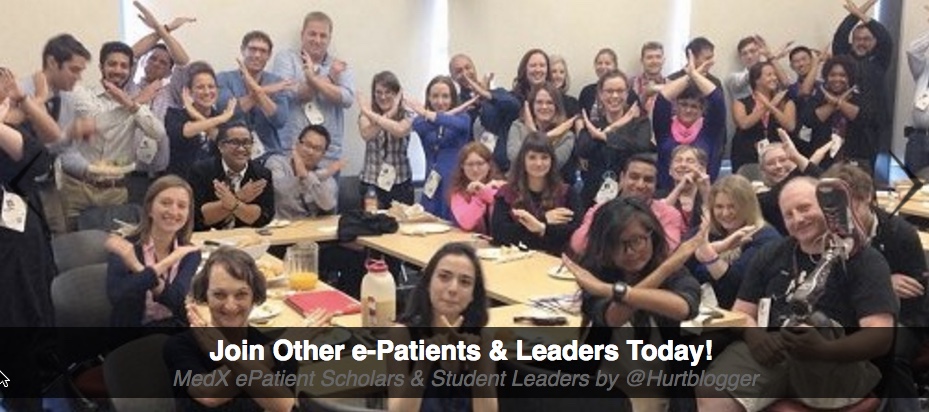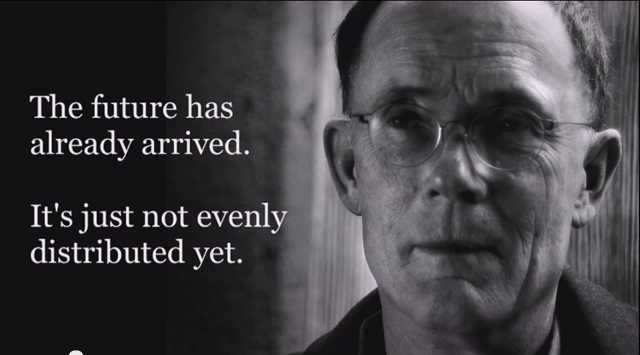Yesterday I wrote about a mistake I made last year at Medicine X, behaving unfairly to a volunteer while over-tired. At the end I said “I believe in introspection – ‘the examined life,’ as they say – and continuous self-improvement,” and that I’d be saying more about what I’ve learned.
In potentially troubling times, what makes a difference is what you’re committed to, because that’s where your compass points even when things get bumpy. My goal in this essay is to close out the episode having learned something. Here’s what I see.
What I’m committed to is building a new reality, a far more patient-centered and participatory reality in healthcare around the world, achieving more of medicine’s potential, for everyone’s benefit.
This is rooted in my experience surviving a near-fatal cancer, aided in no small part (according to my oncologist) by the online community of e-patients my primary physician recommended. This is not a trivial point: many doctors (and even governments) tell patients to stay off the internet, and that’s simply out of date. (e-Patients first showed up in a big-name medical journal in 2004.) Today I want both patients and clinicians to modernize their habits and achieve medicine’s potential.
But this is a culture change for everyone, and it’s hard, as both Medicine X and its spiritual cousin the Society for Participatory Medicine (S4PM) know, and as many of us know as individual patient voices. It’s a long uphill fight, because we’re working to overcome megatons of inertia in the biggest industry in human history. I’ve written about its parallels with other social movements, and we in this movement have all experienced how hard it is to get heard in a multi-trillion-dollar industry where nobody, nobody, nobody sees ROI (return on investment) from funding you. So for all of us, it can get exhausting.

Observation: one bright spot has been Medicine X (#MedX). Ever since I first heard of it from Susannah Fox in 2012 it’s been clear that this is one of the few conferences in the world that is truly built around the ultimate stakeholder – the person for whom healthcare exists. Medicine X, like S4PM and like individual patient voices, has struggled with funding, for instance my “ratty boxers” post, about when I literally couldn’t afford to replace worn-out underwear. For three years I bounced checks and incurred late fees, until finally I broke even and hung out my shingle – I got a small office in the basement of a dentist’s building.
MedX, through its funding sponsors, provides financial support for a number of e-patients to attend every year. Every healthcare conference in the world should do this. A similar announcement of a patient sponsorship grant was made yesterday by another event. The world is changing. Hallelujah.
Observation: to grow the movement, we promote each other – me in my blogging and by mentioning some of their famous epatients in my speeches (they spell epatient without the hyphen I use), S4PM by blogging about MedX and in featuring the photo above (of MedX epatient advisors) on the S4PM site, painter/activist Regina Holliday by telling everyone about everyone, in words and pictures. And all of us on social media.
To offer help to other patient speakers, my Speaker Academy blog series is an effort to share what I’ve learned in creating a new business (professional patient speaker) out of nothing. I don’t copyright my slides, as professional speakers often do; I post most of them on Slideshare for anyone to use, and post every speech video on my website. The purpose is to make it easy to spread the word.
I’m similarly a big supporter of (and volunteer advisor to) the Patient Voice Institute, which is formalizing patient principles, and I donate what I can to crowdfunding patient voices and projects, for instance Regina’s magnificent Cinderblocks gathering. I want this movement to grow, with or without industry funding, and we in the movement aren’t waiting: we know that action is important.
Observation: As my speaking business turned the corner I took on more obligations, helping committed people do the work, sometimes more than I could handle. More than once my doctor warned me not to get exhausted. But one of my policies for years has been a “pay me with action” discount – the harder someone is working toward the future we want, the harder I’ll work with them – and in September last year, leading up to MedX, I agreed to craziness: I did a series of 18 events in 30 days (15 of them in one 10 day stretch), traversing 35 time zones (back & forth) and 26,000 air miles.
Last was MedX, and by then I was exhausted. So exhausted that, while helping a colleague on her slides late one night, I spilled tea into my computer, killing it. So exhausted that I spaced out and missed the most important speech of the event to me, the OpenNotes talk by Tom Delbanco (leader of OpenNotes), whom I revere.
And I got so exhausted that on the morning of my speech, while doing my usual last-minute changes to my talk, when a volunteer asked for my slides for the third time in 15 minutes, I grabbed his arm in frustration and swore. Not acceptable, no matter what.
(I always insist on taking my computer on stage (not projecting from backstage), so I can make last minute changes and walk right up there, without putting the backstage crew in panic. It’s part of how I make my talks relevant. But MedX doesn’t allow that, and I’ve known it for years.)
I also believe in personal responsibility, so I fully accept responsibility for the whole thing. I created my policies, I accepted the workload, etc – I have no complaints. My point in writing this is that I want the entire MedX community (and all e-patients) to be clear about how important this movement is to me, and how important they in specific are, and to be clear that what I did while exhausted, dealing with unusual production requirements, is not aligned with my commitment, and I apologize again.
A separate note comes up in the examination: My limitations have sometimes vexed me (and others), so I’d like to address one specific thing, not related to MedX.
Some people have thought I single-handedly created the Society for Participatory Medicine (since I’m its most public spokesperson), and some have then gotten mad at me for not being better at running it. Well, as I said in February when I announced I was stepping aside, it wasn’t my idea in the first place:-), I was a bystander among the 13 co-founders, and somebody told me to be co-chair, persisting over my protestations that I lacked qualifications.
Well, I’m always happy to be a public voice for things I believe in, so it was game on. But don’t yell at me for being no good at something when I responsibly denied having skill.:-) I do ideas, I do messaging, I do presentations, I spread ideas. That’s my contribution, using what I have to offer – can’t offer more!

Looking ahead: I’ll continue to trumpet MedX and its famous epatients, who prove that the future is already here (right), and any other patient-centered event. I’ll continue donating to grass roots causes like Cinderblocks. I’ll continue writing about e-patients near and far, because make no mistake, this is a social movement, and we need each other.
As a child of the Sixties I know that as any social movement grows, at some point rifts crop up. To me that’s not “uh-oh,” it’s a sign of a movement that’s progressing – not necessarily maturing, but shifting from infancy to adolescence. That always means the movement has survived infancy: it didn’t die, it didn’t fizzle out. Enough people have taken ownership of the ideas for squabbles and disagreements to arise within the movement.
I don’t seek disagreements, but when they show up, I welcome them for what they are. Hallelujah.
What do I see in this part of one examined life? I see lots of commitment, I see lots of passion, I see community, I see truly shared purpose.
But I also see the continuing need to be responsible and take care of each other – to be responsible for our choices, for the need to tend to ourselves (as so many patients with chronic conditions know), to be conscious of the effects of our choices on others.
For my part, in recent months I’ve begun altering my approach. I’m being more responsible about accepting workload, I’m getting more sleep, I’ve begun finishing presentations before event day (sometimes), I’ve put more emphasis on thinking ahead – which has never come naturally for me, because I’m fundamentally an improv guy. The difference is that now, being prepared in advance has a clear connection to what I’m committed to.
Here’s to the movement, here’s to social change, here’s to colleagues and comrades, here’s to Medicine X and 2017. My deep and heartfelt thanks to every single person who pours heart and soul into this work.


Dave,
Thank you for all that you are doing, and for your openness in being an e-patient and a good person. Just as I feel that now I got a hang on the movement, you shine another light, bring up another point, learn from others and share it with us all. You give so much to the world.
Thank you for your encouragement when I needed some, for your help whenever I asked for it, and for your honesty. I’ll keep listening and learning.
Well that’s a wonderful thing to hear, from you, Ileana, because you’re one of the purest examples I know of someone who experienced suffering and has done so much to find a way, some way, any way, to help improve the world. Bless you.
Thanks for writing this Dave. I think you are spot on about this being a social movement and although you aren’t perfect (who is??) the work you’ve done with others has been huge in raising awareness of this ongoing change in healthcare.
And I also appreciate you encouraging me these past few years with my own projects.
Life is a learning experience. :)